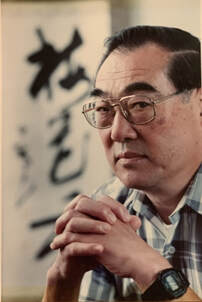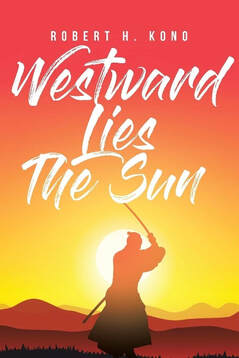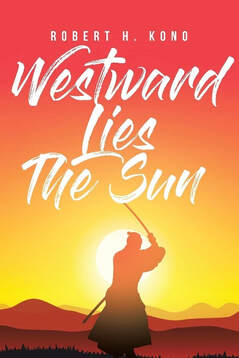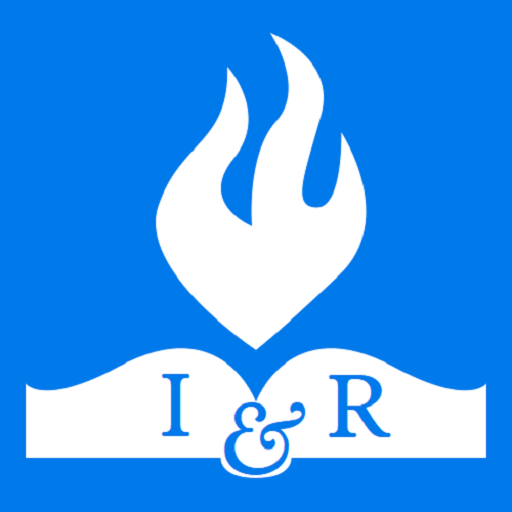 Today, I am pleased to welcome author Robert H. Kono to Interviews & Reviews. Robert was born in 1932, grew up in LA and its environs and was dumped into America’s concentration camps during WWII. He was repatriated to war-torn Japan in 1946 where he grew up in lonely exile. In 1959 he was able to return to the United States to get married and finish his college education. Robert has an interesting story to tell and today he is going to introduce us to his book Westward Lies the Sun. Robert, welcome to I & R!  How long have you been writing? I was bitten by the writing bug at the early age of six when the private teacher I had published two of my poems. But it wasn’t until college that I began writing in earnest. Having to hone my English language skills after growing up in postwar Japan, to which I had repatriated with my family after the war. I was on the verge of losing my language and struggled to retain and master it. How many books have you written? I’ve written ten so far, six of which I’ve published, and they are described on my website, rhkohno.com. The remaining four are stored on my computer. I am at work on the eleventh novel, the third book of a trilogy depicting a story patterned after my life. Westward Lies The Sun is the sixth novel I published and was written later in life. What is the hardest thing about writing for you? I believe that plotting a novel is the most difficult part of writing that will engage and captivate the reader. To hold the interest of the reader till the very last word of a work is the ultimate goal that requires much thought, creativity, and discipline. Which do you enjoy more, the research part for a book or the writing? Research and creative writing go together. You can’t have one without the other. I enjoy both since research requires that one delve into structure and content to form the backbone or essence of work. Writing demands that one apply creativity to bring order out of the chaos, represented by the jumble of information gathered about the topic. The act of writing is selective and will glean the appropriate material out of research to flesh out the theme of the work. What is the central theme of your book? Westward Lies The Sun is about a Japanese American attorney’s search for an understanding of his relationship with God and a quest to determine if there is a God, to begin with. The question is dealt with in a variety of ways in the novel, first by the recurring discussions of the protagonist’s poker group and then by his being shipwrecked on an uninhabited island in Micronesia when he and his family go on a vacation. It is the same island where he returns at the end to engage in a showdown with his nemesis, using the stolen but recovered heirloom samurai sword in combat. What inspired you to write this book? I have six grandchildren who are coming of age, and I wanted to provide them with some sort of guide that they could use as a point of departure in their further growth. As such, I envisioned young and adult readers as I wrote the novel. Assuming that the topic of searching for God and one’s relationship to the universe for an understanding of oneself was universal. Which character do you like the most? Greg Sonoda, the main character, engages me the most. He embodies all the traits of a questing person seeking answers to the big questions of life that occur to all of us at one time or another, questions that either engage us for a lifetime or are of fleeting interest but, nevertheless, occur. The novel is meant to be a point of departure for the reader who is challenged to seek a better understanding of his place in the universe and himself. Is there a message in your book that you want your readers to grasp? I want the reader to come away from the book inspired to know more about his intrinsic value and potential as a human being who has been put through the traces and in spite of the ups and downs of life, its successes and failures, its persistent vicissitudes, winds up humbly thanking God for his survival and for life itself–such as it is–for, to my way of thinking, gratitude is the gateway to heaven. I know our readers will be intrigued by the fact that you and your mother were placed in concentration camps during the war. Your website says your father was arrested the night of Pearl Harbor. This must have been a terrifying time for you. Can you tell us about this experience? As a boy of nine, I remember well the night the FBI agents, accompanied by the county sheriff, came to arrest my father the day Pearl Harbor was bombed. He was put into a detention center while my mother and I were placed in a separate camp. She took ill in one of the camps and had to be transferred to a state hospital in California while I joined my father at a family camp in Crystal City, Texas, from which we repatriated to war-torn Japan in 1946. I had occasion to meet a missionary lady by the name of Mabel Frances in Matsuyama, the capitol of Ehime Prefecture. I came to know the Lord as my savior through her and went on to Yokohama to attend St. Joseph College, a high school taught by the Marianists, and joined a Christian youth group called the Chapel Teens in Tokyo. I became one of the officers. Shortly afterward, I was hired by the CIA as an interpreter/translator, in which capacity I handled Top Secret documents and reports. I returned to the United States in 1959 after spending thirteen years in exile in postwar Japan (seventeen years out of mainstream America, counting the years spent incarcerated) to get married and complete my college education. I recently had my ninetieth birthday and live in a retirement center in Beaverton with one of my sons nearby. My other son lives in Utah. I have six grandchildren. What an incredible story! Thank you, Robert, for sharing it with us, and for those interested in Robert’s novel, Westward Lies the Sun, you can find it on Amazon!  Greg Sonoda, a Japanese American attorney, embarks on a quest to determine what influence God has in his life. In the back of his mind is the question, first and foremost, of whether God exists at all. God is such an elusive concept to a humanist, who, from his earliest years, was made to question God's very existence-he suffered in the concentration camps for the duration of WWII-and he doubts his efforts will ever come to fruition. In Westward Lies the Sun, Greg's search for truth is given voice during the frequent debates with his poker foursome, although the late-night discussions produce more questions than answers. But they do serve to articulate thoughts and feelings about sundry issues such as the search for Greg's family heirloom: a samurai sword stolen during Greg's incarceration in the camps. More significantly, Greg is forced to ponder God's hand in his family's survival after being shipwrecked on a small, uninhabited Micronesian island. Greg and his family make several discoveries on the island that lead to financial success and miraculous physical healing. But will the island also heal Greg spiritually? The family sword-Onimaru-is ultimately used in a showdown on the island with Greg's quest for God, together with his mental and physical survival, hanging in the balance. Leave a Reply. |
�
Categories
All
Archives
July 2024
|

 RSS Feed
RSS Feed
9/7/2022
0 Comments